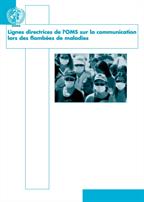Communicating risk in public health emergencies
In public health emergencies, one essential lifesaving action is risk communication. People have a right to know how to protect their health and have a responsibility to take informed decisions to protect themselves, their loved ones and those around them. Effective risk communication not only saves lives and reduces illness, it enables countries and communities to preserve their social, economic and political stability in the face of emergencies.
Risk communication is one of 8 core capacities in order to prevent the global spread of disease as required under the International Health Regulations (2005). Risk communication is also a component of global and country preparedness for an influenza pandemic, as part of the Pandemic Influenza Preparedness Framework.
WHO provides global guidance to countries on the best practices for risk communication. The Organization also supports countries to build capacity through:
- establishing policies, strategies and plans for risk communication;
- providing training for key personnel;
- engaging and training journalists on how to report on health emergencies; and
- running simulation exercises to test national systems.
Additionally, WHO provides hands on support in emergency response by deploying its Emergency Communications Network to affected countries and regions to work hand-in-hand with national and local authorities.



